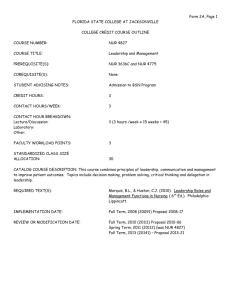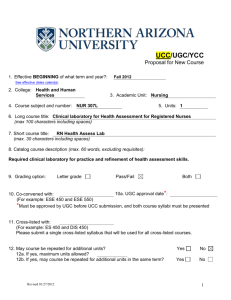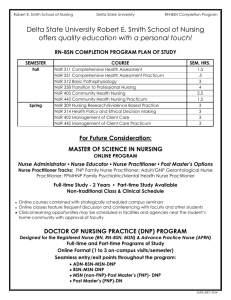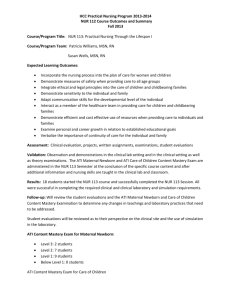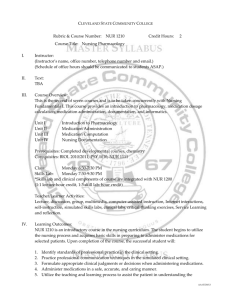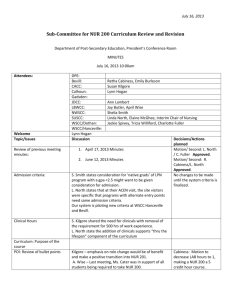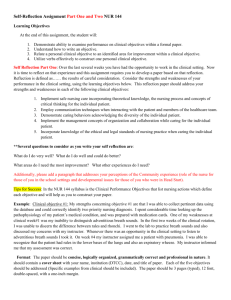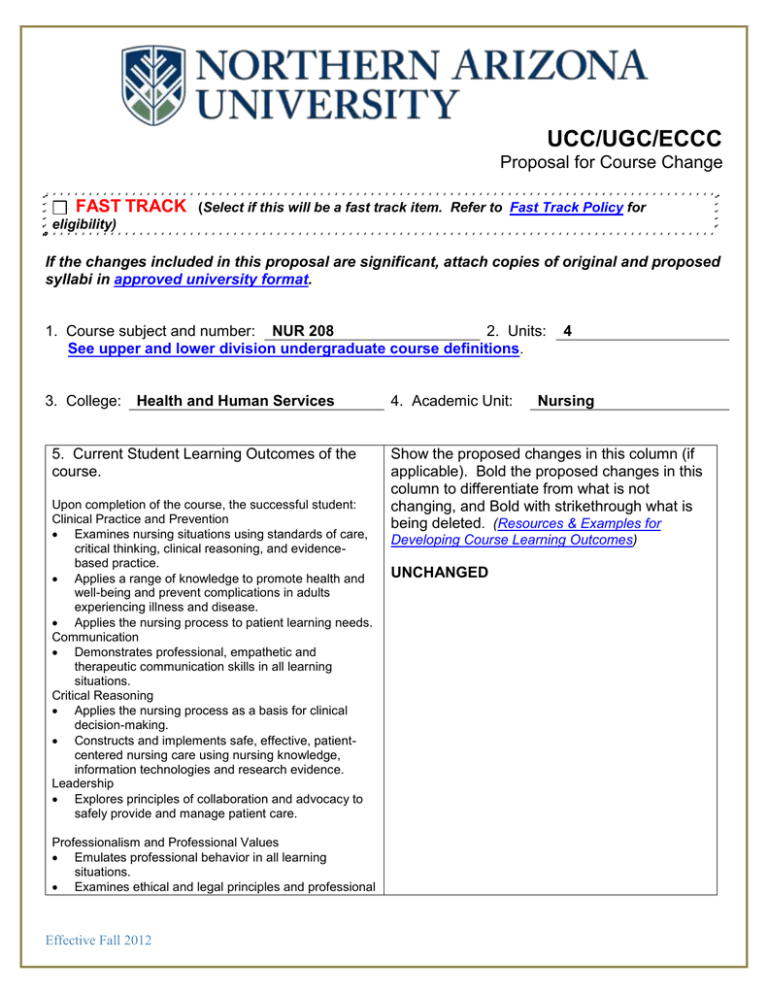
UCC/UGC/ECCC
Proposal for Course Change
FAST TRACK
(Select if this will be a fast track item. Refer to Fast Track Policy for
eligibility)
If the changes included in this proposal are significant, attach copies of original and proposed
syllabi in approved university format.
1. Course subject and number: NUR 208
2. Units:
See upper and lower division undergraduate course definitions.
3. College:
Health and Human Services
5. Current Student Learning Outcomes of the
course.
Upon completion of the course, the successful student:
Clinical Practice and Prevention
Examines nursing situations using standards of care,
critical thinking, clinical reasoning, and evidencebased practice.
Applies a range of knowledge to promote health and
well-being and prevent complications in adults
experiencing illness and disease.
Applies the nursing process to patient learning needs.
Communication
Demonstrates professional, empathetic and
therapeutic communication skills in all learning
situations.
Critical Reasoning
Applies the nursing process as a basis for clinical
decision-making.
Constructs and implements safe, effective, patientcentered nursing care using nursing knowledge,
information technologies and research evidence.
Leadership
Explores principles of collaboration and advocacy to
safely provide and manage patient care.
Professionalism and Professional Values
Emulates professional behavior in all learning
situations.
Examines ethical and legal principles and professional
Effective Fall 2012
4. Academic Unit:
4
Nursing
Show the proposed changes in this column (if
applicable). Bold the proposed changes in this
column to differentiate from what is not
changing, and Bold with strikethrough what is
being deleted. (Resources & Examples for
Developing Course Learning Outcomes)
UNCHANGED
standards that are foundations to nursing practice.
Explores caring’s essential elements as they are
expressed in holistic patient-centered care.
Global Health
Discusses the impact of health equity and social
justice on nursing and health care in a variety of
settings.
6. Current title, description and units. Cut and
paste, in its entirety, from the current on-line
academic catalog*
http://catalog.nau.edu/Catalog/.
Show the proposed changes in this column
Bold the proposed changes in this column to
differentiate from what is not changing, and
Bold with strikethrough what is being deleted.
NUR 208 ADULT HEALTH AND ILLNESS I
(4)
Description: This course focuses on nursing care
of adults experiencing health-illness transitions.
Letter grade only. Course fee required.
Units: 4
Prerequisite: NUR 205, NUR 205L, NUR 214,
NUR 214L, NUR 371
Corequisite: NUR 208L
NUR 208 345 ADULT HEALTH AND
ILLNESS I (4)
Description: This course focuses on nursing care
of adults experiencing health-illness transitions.
Letter grade only. Course fee required.
Units: 4
Prerequisite: NUR 205, NUR 205L, NUR 214,
NUR 214L, NUR 225, NUR 225L, NUR 371
Corequisite: NUR 208L 345L NUR 373
*if there has been a previously approved UCC/UGC/ECCC change since the last catalog year, please copy the approved
text from the proposal form into this field.
7. Justification for course change.
NUR 208 and NUR 208L are required in the second semester of the professional program (first
semester, junior year). Course number change to upper division better reflects the course
content and how it is currently offered.
8. Effective BEGINNING of what term and year?
FALL 2015
See effective dates calendar.
IN THE FOLLOWING SECTION, COMPLETE ONLY WHAT IS CHANGING
CURRENT
Current course subject and number:
PROPOSED
Proposed course subject and number:
NUR 208
NUR 345
Current number of units:
Proposed number of units:
Current short course title:
Proposed short course title (max 30 characters):
Current long course title:
Proposed long course title (max 100 characters):
Current grading option:
letter grade
pass/fail
Effective Fall 2012
or both
Proposed grading option:
letter grade
pass/fail
or both
Current repeat for additional units:
Proposed repeat for additional units:
Current max number of units:
Proposed max number of units:
Current prerequisite:
Proposed prerequisite (include rationale in the
justification):
NUR 225, NUR 225L, NUR 371
NUR 205, NUR 205L, NUR 214, NUR 214L,
NUR 371
Current co-requisite:
Current co-convene with:
Proposed co-requisite (include rationale in the
justification):
NUR 345L, NUR 373
Proposed co-convene with:
Current cross list with:
Proposed cross list with:
NUR 208L
9. Is this course in any plan (major, minor, or certificate) or sub plan (emphasis)? Yes
No
If yes, describe the impact. If applicable, include evidence of notification to and/or response
from each impacted academic unit.
Nursing; B.S.N.
10. Is there a related plan or sub plan change proposal being submitted?
If no, explain.
Yes
No
11. Does this course include combined lecture and lab components?
Yes
If yes, include the units specific to each component in the course description above.
No
Answer 12-15 for UCC/ECCC only:
12. Is this course an approved Liberal Studies or Diversity course?
If yes, select all that apply.
Liberal Studies
Diversity
Yes
No
Yes
No
14. Is this course listed in the Course Equivalency Guide?
Yes
No
15. Is this course a Shared Unique Numbering (SUN) course?
Yes
No
13. Do you want to remove the Liberal Studies or Diversity designation?
If yes, select all that apply.
Liberal Studies
Diversity
Both
Both
FLAGSTAFF MOUNTAIN CAMPUS
Scott Galland
Reviewed by Curriculum Process Associate
Approvals:
Effective Fall 2012
1/12/2015
Date
Department Chair/Unit Head (if appropriate)
Date
Chair of college curriculum committee
Date
Dean of college
Date
For Committee use only:
UCC/UGC Approval
Date
Approved as submitted:
Yes
No
Approved as modified:
Yes
No
EXTENDED CAMPUSES
Reviewed by Curriculum Process Associate
Date
Approvals:
Academic Unit Head
Date
Division Curriculum Committee (Yuma, Yavapai, or Personalized Learning)
Date
Division Administrator in Extended Campuses (Yuma, Yavapai, or Personalized
Learning)
Date
Faculty Chair of Extended Campuses Curriculum Committee (Yuma, Yavapai, or
Personalized Learning)
Date
Chief Academic Officer; Extended Campuses (or Designee)
Date
Approved as submitted:
Yes
No
Approved as modified:
Yes
No
Effective Fall 2012
CURRENT/PROPOSED SYLLABUS
College of Health & Human Services
School of Nursing
NUR 208 345
Adult Health & Illness I
Syllabus
Fall 2014
Course Leader:
Pamela Stetina, RN, PhD
Nursing Building, Room 109
Office Phone: 928-523-7209
Pager: 928-913-7743
Pamela.Stetina@nau.edu
Office hours: TBA and by appointment.
Faculty Team (Flagstaff):
Christina Moorioian-Pennington, RN, MSN
Nursing Building, Room 218
Office Phone: 928-523-6282
Mobile Phone: 602-743-6888
Christina.Mooroian-Pennington@nau.edu
Dawn Rivas, RN, MS
Nursing Building, Room 105
Office Phone 928-523-8677
Mobile Phone: 928-699-5358
Dawn.Rivas@nau.edu
Laboratory
Michelle Musich, RN, MS
Nursing Building, Room 207
Office Phone: 928-523-5874
Michelle.Musich@nau.edu
Simulation Specialist
Bobby Eccleston, MSN, RN
Nursing Building, Room 121
Office Phone: 928-523-2608
Bobby.Eccleston@nau.edu
General Course Information
Course Number:
NUR 208 345
Course Title:
Adult Health & Illness I
Credit Hours:
4 credits/ 60 clock hours
Prerequisites:
NUR 205, NUR 205L, NUR 214, NUR 214L, NUR 215; BIO 320 NUR 225, NUR 225L, NUR 371
Corequisites:
NUR 208L NUR 345L, NUR 373
Course Description
This course introduces nursing concepts necessary for beginning the care of adult clients with selected illness/disease
conditions, and the use of the nursing process to promote health and healing. Students apply pathophysiology and
pharmacology principles to focus assessment, plan and implement care, and evaluate outcomes. Utilization of research
Effective Fall 2012
evidence and clinical practice guidelines are integrated with caring theory to plan and provide holistic care, promote
health, and advocate for patients.
Course Learning Outcomes
Upon completion of the course, the successful student:
Clinical Practice and Prevention
Examines nursing situations using standards of care, critical thinking, clinical reasoning, and evidence-based practice.
Applies a range of knowledge to promote health and well-being and prevent complications in adults experiencing
illness and disease.
Applies the nursing process to patient learning needs.
Communication
Demonstrates professional, empathetic and therapeutic communication skills in all learning situations.
Critical Reasoning
Applies the nursing process as a basis for clinical decision-making.
Constructs and implements safe, effective, patient-centered nursing care using nursing knowledge, information
technologies and research evidence.
Leadership
Explores principles of collaboration and advocacy to safely provide and manage patient care.
Professionalism and Professional Values
Emulates professional behavior in all learning situations.
Examines ethical and legal principles and professional standards that are foundations to nursing practice.
Explores caring’s essential elements as they are expressed in holistic patient-centered care.
Global Health
Discusses the impact of health equity and social justice on nursing and health care in a variety of settings.
Course Structure/Approach
NUR 208 NUR 345 will utilize a variety of approaches to meet the course objectives. These instructional methods may
include, but are not limited to: lecture, audio-visual material, guided discussion, group work, demonstration and return
demonstration, role playing, computer programs, decision making exercises, written tests and quizzes, and written
assignments. While the faculty will provide guidance and consultation, the student is responsible for identification of
learning needs, self-direction, seeking consultation and demonstration of course objectives.
Required Textbooks
ALL TEXTBOOKS FROM PREVIOUS NURSING COURSES
Clickers
**Kee, J. L. (2010). Laboratory and diagnostic tests with nursing implications (8th ed.). Upper Saddle River, NJ: Prentice
Hall.
Lewis, S.L., Dirksen, S.R., Heitkemper, M.M., & Bucher, L. (2014). Medical-Surgical Nursing: Assessment and
management of clinical problems (9th ed.). St Louis: Elsevier: Mosby
Lewis, S.L., Dirksen, S.R., & Bucher, L. (2014) Study Guide for Lewis, S.L., Dirksen, S.R., Heitkemper, M.M., & Bucher, L.
(2014). Medical-Surgical Nursing: Assessment and management of clinical problems (9th ed.). St Louis: Elsevier:
Mosby.
**Wilson, B.A., Shannon, M.T. & Shields, K.M. (2015). Pearson nurse’s drug guide 2015. Upper Saddle River, New
Jersey: Pearson Prentice Hall.
Effective Fall 2012
**YOU MAY USE ANY NURSING DRUG OR LABORATORY/DIAGNOSTIC RESULTS BOOK AS LONG AS IT IS NOT
OVER TWO YEARS OLD.
Recommended Textbooks
American Psychological Association. (2010). Publication manual of the American Psychological
Association. (6th ed.). Washington, DC: American Psychological Association.
Hale, A. & Hovey, M.J. (2013). Fluid and electrolyte notes: Nurse’s clinical pocket guide. Philadelphia: FA Davis.
Silvestri, L.A. (2010). Saunders comprehensive review for NCLEX-RN examination (5th ed.).
Philadelphia, PA: W. B. Saunders.
Wilson, B.A., Shannon, M.T. & Stang, C.L. (2011). Pearson intravenous drug guide 2011-2012 (2nd ed.). Upper Saddle
River, New Jersey: Pearson Prentice Hall.
Online Requirements
Evolve Online: https://evolve.elsevier.com/ (Case studies, text online resources, SimChart)
Kaplan Resources: https://nursing.kaplan.com/s_login.aspx
Blackboard Learn assignments and readings: http://bblearn.nau.edu
Emergency Textbook Loan Program:
To help students acquire the materials they need to be successful in class.
NAU has partnered with Follett to create the Emergency Textbook Loan program. The program is administered by the
LEADS Center. The program assists students with unmet financial need in obtaining required textbook(s) and other
materials for courses. Students must apply and meet eligibility criteria before textbooks are purchased on their behalf.
Textbooks must be returned at the end of the term in which the textbooks were loaned. More information can be found
online:
http://nau.edu/LEADS-Center/Textbook-Loan-Program/
Assessment of Student Learning:
In order to pass NUR 208 345, the student must achieve the following:
1.
An overall course grade of 78% or higher.
2.
A combined average of 78% on all exams, except the Kaplan exam; students who do not achieve a 78% exam
average will receive an F for the course.
Various activities will be used to assess student learning and mastery of content across the semester. These include
course examinations, in-class activities, case studies and the Kaplan specialty achievement exam. Weighting of these
activities and calculation of grade is as follows:
Evaluation Tool
Five of six* online Evolve Case Studies
Patient education brochure
Kaplan Practice Exams
Test 1
Test 2
Test 3
Comprehensive Final Exam
Kaplan Exam
Total Percentage
Grading Scale
A = 93-100%
B = 84 – 92%
C = 78 – 83% (A grade of "C" or above is a passing grade in this course).
F = <78%
COURSE POLICIES:
Lecture
Effective Fall 2012
Percentage
10%
10%
5%
15%
15%
15%
25%
5%
100%
1.
2.
3.
4.
5.
6.
7.
8.
9.
10.
11.
12.
13.
14.
Please see the NAU classroom management statement:
http://nau.edu/uploadedFiles/Administrative/EMSA_Sites/Folder_Templates/_Forms/Classroom_Disruption_Polic
y.pdf
Lecture materials, articles, and other information may be found on Blackboard Learn or distributed in class.
Professional communication and conduct is expected at all times.
Cell phones and pagers are to be turned off or silenced for the duration of the class.
No children are allowed in class at any time. Visitors are allowed only with permission from the instructor.
It is the student’s responsibility to obtain handouts, lecture notes, and information from announcements in the
event a class is missed.
Taping of lectures is permitted in this course. Clinical examples cannot be discussed outside the classroom due to
patient confidentiality.
Students are expected to have read the assigned reading and come to class prepared to discuss the topics, and
to ask relevant questions concerning content.
Students are expected to come to class on time.
All assignments and exams are to be completed by each student individually without the help of others unless
specifically identified as a group project or the student has been directed to seek help from a designated NAU
tutor or teaching assistant.
Assignments are due at 11:59 pm Arizona Time (MST) on the date they are due. Assignment due dates are
printed on the course schedule. Late assignments will not be accepted unless prior arrangements have been
made with the instructor.
*There will be six Evolve online case studies assigned. The lowest case study score will be dropped; therefore,
only five case studies count toward the case study portion of the grade. The first question submission and first
score of the case study will be recorded as the grade. Please submit your score to the assignment tool in
BBLearn.
No extra credit assignments will be given for this course.
Rounding will only be done on the final overall grade. Final grades > 0.5 (must be exactly 0.5 or higher) will be
rounded up to the next whole number; final grades < 0.5 will be rounded down to the next whole number.
Examinations (Other than Kaplan)
1.
Students must achieve a combined average of 78% on all exams (except Kaplan) to pass the course.
2.
All exam dates and times are printed on the course schedule. Exam dates, times, and locations are subject to
change.
3.
Students will be allotted one and one half (1.5) hours to complete the three major examinations and two (2) hours
to complete the final examination; this includes bubbling in scantron forms. Announcements will be made when
there are 15 and 5 minutes remaining.
4.
Students who are late for exams will not be given extra time.
5.
No examination or test material is to leave the classroom with a student as it may be perceived as cheating.
6.
Any student determined by faculty to have cheated on the exam will receive a score of zero for that exam and will
be subject to failure from the course.
7.
Retests/makeup tests: Exams will be given only on the date and time scheduled. Make-up examinations,
except for the Kaplan, will be provided only in extraordinary circumstances. The Kaplan exam cannot be madeup. Students who are absent from an examination for any reason must call the course leader at least 24 hours
prior to the examination. Students who do not call before an examination will receive a zero for that examination
and will not be eligible to take a make-up examination except for extreme circumstances. Any make-up exam
must be completed within two business days of the original exam date or at the discretion of the course faculty;
the final exam must be completed within two business days or by the last day of final exams, whichever comes
first or students may receive a zero on the exam. Make up tests may be in any form (oral, written, essay) over the
same objectives as the multiple choice exam.
8.
Appointments and individual discussion regarding the exam may not be made until item analysis is complete.
9.
For each exam:
o Cell phones, beepers and other electronic devices must be turned off during exams.
o All books, bags, computers, notes, notebooks, cell phones, water and drink bottles, purses and other personal
belongings will be left at the front of or outside the room.
o Hats and caps are not permitted; ear plugs must be approved by faculty before use.
o Students are expected to stay in the exam room while taking the exam; students may only leave the exam to
use the restroom if they have submitted a note from a health care provider.
o The classroom and surrounding doors are “quiet zones” before, during, and after exams.
o Once you have completed the exam, turn in your exam materials and leave the room quietly; please move
away from the classroom doors.
Effective Fall 2012
o
11.
Exams may cover material from lecture, textbooks, articles, handouts, websites, discussions, and previous
and concurrent courses (including NUR 208L 345L).
o Pencils with erasers, scantron forms, and calculators will be provided.
o Students are required to meet with faculty if they receive C or lower on an exam.
The final examination will be comprehensive.
Attendance Policy
Successful achievement of course outcomes is facilitated by regular class attendance and active engagement in the
learning process. Should an absence be unavoidable, the student shall notify the instructor according to instructions
provided in the course syllabus. Students are responsible for completion of any missed work in accordance with course
policies.
Withdrawal Policy
If a student is unable to attend the course or must drop the course for any reason, it will be the responsibility of the
student to withdraw from the course before the withdrawal deadline (see current NAU Schedule of Classes for deadline:
http://nau.edu/Registrar/Important-Dates/Fall/ - “Session Deadlines”).
Plagiarism, Cheating, and Academic Dishonesty:
Please refer to Appendix G of the NAU Student Handbook
(http://home.nau.edu/images/userimages/awf/9476/ACADEMIC%20DISHONESTY.pdf) for definitions, policies, penalties,
and procedures related to various forms of academic dishonesty.
University Policies
Review the following policies available on the Northern Arizona University Policy Statement website
(http://www4.nau.edu/avpaa/policy1.html):
1. Safe Environment Policy
2. Students with Disabilities Policy
3. Academic Contact Hour Policy
4. Academic Integrity Policy (also see
http://home.nau.edu/images/userimages/awf/9476/ACADEMIC%20DISHONESTY.pdf)
5. Research Integrity Policy
6. Sensitive Course Materials Policy
7. Classroom Disruption Policy (also see
http://nau.edu/uploadedFiles/Administrative/EMSA_Sites/Folder_Templates/_Forms/Classroom_Disruption_Polic
y.pdf)
The Impaired Student policy will be strictly adhered to; there will be no tolerance in for any evidence of substance abuse.
Effective Fall 2012
Week
1
Date
8/26
8/26
2
9/2
3
9/2
9/2
9/9
9/9
4
9/16
5
9/23
9/23
9/23
6
9/30
9/30
9/30
7
10/7
10/7
8
10/14
10/14
9
10/21
10/21
Effective Fall 2012
NUR 208 345 COURSE OUTLINE – Fall 2014
Topic
Preparation
Learning Activities*
Introduction to Course
Lecture
Read Course Content on BBLearn
Introduction to Blackboard Learn
On-Line
Read Ch. 1, 2, 5
Introduction to Medical-Surgical Nursing
View Voiceover PowerPoint slides
Care of the Older Adult
Read Disabilities Experience module
Complete optional Disabilities
Chronic Illness-Rehabilitation
Disabilities Experience
Experience Assessment
Culture
Care of the Patient with Pain
Lecture
Read Course Content on BBLearn
Read Ch. 9, 11
Complete Pain pre quiz
Management of the Perioperative Patient
Lecture
Read Course Content on BBLearn
Read Ch. 18, 19, 20; pp 172-184,
676-680
Read the blood module in BBLearn
Test Taking
Lecture
See Course Content on BBLearn
Syllabus Acknowledgement Due
Assignments
Management of Patients with Fluid,
Lecture
Read Course Content on BBLearn
Electrolyte, and Acid-Base Imbalances
Read Ch. 17
Perioperative Case Study Due (in
On-Line
Evolve Case Study
Fundamentals Section)
Submit score to Assignments
Problems of Regulation and Metabolism:
Lecture
Read Course Content on BBLearn
Management of Patients with Diabetes
Read Ch. 48 ,49
Mellitus
Exam # 1 Weeks 1-3
Proctored
Patient Education Brochure Groups &
In Class
Also Submit to Assignments
Topics
Problems of Male Reproduction
Lecture
Read Course Content on BBLearn
Read Ch. 55; pp. 1218-1220, 12251236
Problems of Renal and Urinary Function
Lecture
Read Course Content on BBLearn
Read Ch. 45, 46. 47; pp. 219-224
Optional Disabilities Experience (Pre &
On-Line
Assignments
Post Assessment) Due
Diabetes Type 1 Case Study Due (in
On-Line
Evolve Case Study
Medical-Surgical Section)
Submit score to Assignments
Problems of Renal and Urinary Function
Lecture
Read Course Content on BBLearn
Read Ch. 45, 46. 47; pp. 219-224
Problems of Regulation and Metabolism:
Lecture
Read Course Content on BBLearn
Management of Patients with Endocrine
Read Ch. 48, 50
Problems
Problems of Mobility: Management of
Lecture
Read Course Content on BBLearn
Patients with Problems of the
Read Ch. 62, 63, 64; pp. 1561-1582,
Musculoskeletal System
1589-1590
Chronic Kidney Disease Case Study
On-Line
Evolve Case Study
Due (in Medical-Surgical Section)
Submit score to Assignments
Exam # 2 Weeks 4-7
Proctored
Problems of Mobility: Management of
Patients with Problems of the
Musculoskeletal System
Lecture
Read Course Content on BBLearn
Read Ch. 62, 63, 64; pp. 1561-1582,
1589-1590
Week
10
Date
10/28
10/28
10/28
10/28
11
11/4
11/4
12
13
14
11/11
11/18
11/18
11/25
11/25
Topic
Problems of Protection: Management of
Patients with Burns
Problems of Protection: Management of
Patients with Integumentary Problems
Patient Education Brochure Due
Preparation
Lecture
Thyroid Disorders Case Study Due (in
Medical-Surgical Section)
Problems of Protection: Management of
Patents with Immunity and Infection
Problems
Osteoporosis Case Study Due (in
Medical-Surgical Section)
NO SCHOOL- VETERAN’S DAY
Exam # 3 Weeks 8-10
Problems of Protection: Management of
Patients with Cancer
On-Line
Problems of Protection: Management of
Patients with Cancer
Lecture
On-Line
Lecture
On-Line
Lecture
Learning Activities*
Read Course Content on BBLearn
Read Ch. 25
Read Course Content on BBLearn
Read Ch. 23, 24, pp. 184-189
Each student upload to
Assignments
Evolve Case Study
Submit score to Assignments
Read Course Content on BBLearn
Read Ch. 14, 15, pp. 528-533, 15821595
Evolve Case Study
Submit score to Assignments
NO SCHOOL
Proctored
See Course Content on BBLearn
Read Ch. 10, 16, 52; pp. 1221-1222,
1225-1236
See Course Content on BBLearn
Read Ch. 10, 16, 52; pp. 1221-1222,
1225-1236
Evolve Case Study
Submit score to Assignments
Human Immunodeficiency Virus (HIV)
and Tuberculosis (Tb) Case Study Due
(in Medical-Surgical Section)
11/25
Kaplan Practice Exams Due
Kaplan Website
12/2
Kaplan Comprehensive Course Exam
Testing Center
15
(Time to be Determined)
12/9
Final Exam-Comprehensive
Proctored
16
*Learning activities: Chapter readings are from:
Lewis, S.L., Dirksen, S.R., Heitkemper, M.M., & Bucher, L. (2014). Medical-Surgical Nursing: Assessment and
management of clinical problems (9th ed.). St Louis: Elsevier: Mosby.
Other assigned readings, including articles, websites, handouts, and PowerPoint slides, will be on the Blackboard Learn
course shell.
**Kaplan date subject to change
Effective Fall 2012

